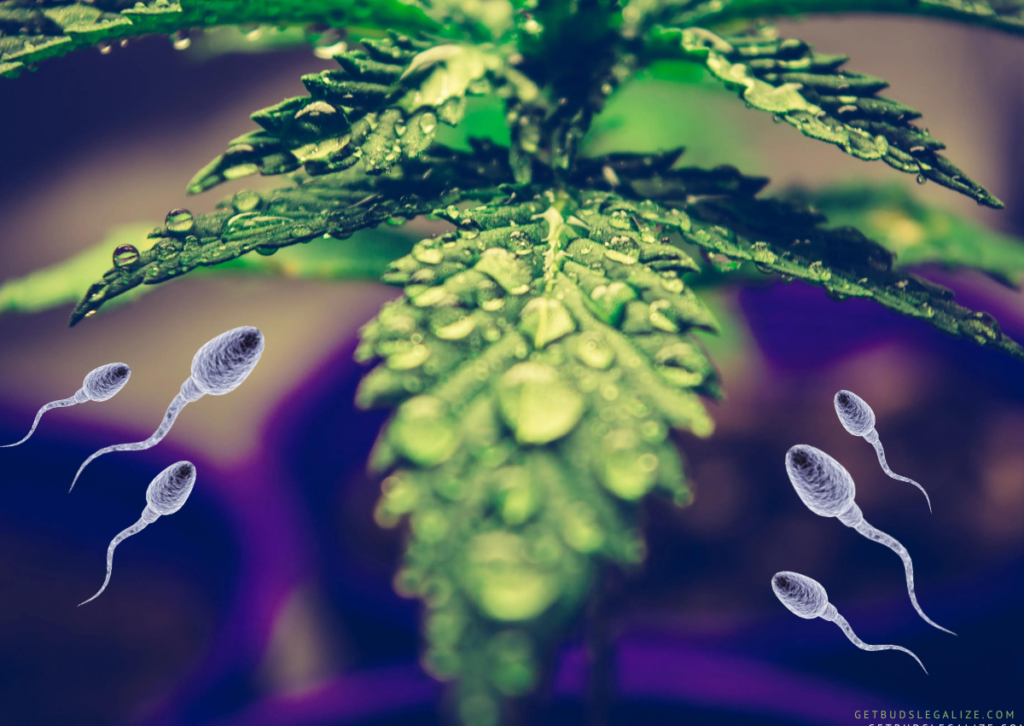Does Smoking Weed Affect Sperm? All You Need to Know
Many people enjoy smoking weed for recreational or medicinal purposes, but they may not be aware of how it can affect their fertility.
Weed, or cannabis, contains a psychoactive compound called tetrahydrocannabinol (THC) that can interfere with the production and quality of sperm.
In this blog post, we will explore the effects of smoking weed on sperm and what you can do to protect your reproductive health.
How Does Cannabis Affect Male Fertility?
There is now a body of evidence supporting the multi-factorial impact of marijuana use.
- Reduced sperm concentration
- Changes in sperm count, motility, and morphology
- Hormone changes
- Reduction in libido and sexual performance
- Reduced sperm viability
Studies have found that sperm contain cannabinoid receptors which indicate that cannabis can interfere with their function. Research has also shown a strong association between marijuana use in men and reduced sperm count and concentration. Men who use marijuana more than once a week have almost 30% less sperm count and concentration, and this effect can last up to five to six weeks even after discontinuing the use of marijuana.
Studies conducted in both the US and the UK indicate that men who had used marijuana three months before giving a semen sample have abnormal sperm shape, also known as morphology. This is true even for younger men who are 30 years old or younger. The use of cannabis, whether it be for therapeutic or recreational purposes, has also shown a decrease in sperm motility, which is the ability of the sperm to move efficiently, as well as its viability, which measures how long the sperm can live.
Marijuana not only affects sperm quality, count, and viability but also impacts reproductive hormones, specifically the luteinizing hormone (LH). LH plays a crucial role in fertility by regulating testosterone levels. Recent studies have shown that the frequency of marijuana use has a more detrimental impact on testosterone levels in men than the amount used.
Prolonged and consistent cannabis use in males can have an impact on reproductive health. One of the effects is testicular atrophy, a condition that causes the testes to diminish in size and function due to direct damage to the seminiferous tubules (the tubes where the sperm is produced). Although this condition is often reversible, it is important to consider it when assessing male fertility in individuals with a long history of frequent marijuana use.
Lastly, there is strong evidence that marijuana affects male fertility by impairing erectile function. Erectile dysfunction (ED) is a condition in which a man has difficulty maintaining or achieving an erection sufficient for sexual intercourse. ED can have various causes, such as psychological stress, physical illness, or medication side effects. However, marijuana use may also contribute to ED by damaging the blood vessels and nerves that are involved in erection.
Research has suggested that chronic marijuana use can increase the risk of ED in men. For example, a study from 2010 found that 78% of men who reported having ED were frequent marijuana users, compared to only 3% of men who did not use marijuana. Another study from 2011 found that marijuana use was associated with lower levels of nitric oxide, a molecule that helps relax the blood vessels and improve blood flow to the penis.

How Much Weed Is Too Much For Your Sperm Quality?
The exact amount of weed that can affect sperm is not clear, as different studies have used different methods and definitions of cannabis use. However, some general guidelines are:
- Occasional use: Smoking once a month or less may not have a significant impact on sperm quality, but it is still advisable to avoid it if you are trying to conceive.
- Moderate use: Smoking once a week or more may reduce your sperm count and motility by up to 30%, according to some studies. This can make it harder to achieve pregnancy.
- Heavy use: Smoking every day or multiple times a day can severely impair your sperm quality and fertility. Some studies have found that heavy cannabis users have up to 70% lower sperm counts than non-users.
How Long Does Weed Affect Sperm?
The effects of smoking marijuana on sperm are not permanent, but they may take some time to reverse.
Sperm production takes about 74 days, so any changes in your lifestyle or habits will take at least three months to show up in your semen analysis.
Therefore, if you are planning to conceive, you should quit smoking weed at least three months before trying.
What Can You Do To Improve Your Sperm Quality?
If you are concerned about your sperm quality and fertility, there are some steps you can take to improve them, such as:
1. Quit Smoking Weed:
The most obvious and effective way to improve your sperm quality is to stop smoking marijuana completely. This will allow your body to recover from the effects of THC and restore your natural hormone balance.
2. Quit Smoking Tobacco:
Tobacco smoking can also harm your sperm quality and fertility, as well as increase your risk of cancer and other diseases. Quitting tobacco will improve your overall health and well-being.
3. Limit Alcohol Intake:
Alcohol consumption can also affect your sperm quality and fertility, especially if you drink excessively or binge drink. Alcohol can lower your testosterone levels, reduce your sperm count and motility, and damage your sperm DNA. Limiting your alcohol intake to no more than two drinks per day can help protect your reproductive health.
4. Eat A Healthy Diet:
Eating a balanced diet rich in antioxidants, vitamins, minerals, and omega-3 fatty acids can help boost your sperm quality and fertility. Antioxidants can protect your sperm from oxidative stress and DNA damage, while vitamins and minerals can support your hormone production and metabolism. Omega-3 fatty acids can improve your sperm membrane fluidity and function. Some foods that are good for your sperm include fruits, vegetables, nuts, seeds, fish, eggs, and whole grains.
5. Exercise Regularly:
Physical activity can also benefit your sperm quality and fertility, as well as your overall health and well-being. Exercise can improve blood circulation, oxygen delivery, testosterone levels, mood, and stress management. However, avoid excessive or strenuous exercise that can overheat your testicles or cause injuries. Aim for at least 150 minutes of moderate-intensity exercise per week.
6. Manage Stress:
Stress can negatively affect your sperm quality and fertility by disrupting your hormone balance, reducing your libido, impairing your erectile function, and affecting your mood and sleep quality. Stress can also make you more likely to smoke marijuana or engage in other unhealthy behaviors. Therefore, managing stress is essential for your reproductive health. You can try various stress-relief techniques such as meditation, yoga, breathing exercises, massage, hobbies, or counseling.
Conclusion
Smoking marijuana can affect sperm quality and fertility in various ways. It can reduce sperm count, motility, morphology, and DNA integrity by interfering with hormone production causing oxidative stress and impairing testicular function.
If you are trying to conceive, you should quit smoking at least three months before trying and adopt a healthy lifestyle that supports your reproductive health. Doing so can improve your chances of having a healthy baby and a happy family.
FAQs about How Does Smoking Weed Affect Sperm
Weed, also known as marijuana, cannabis, pot, or grass, is a plant that contains psychoactive compounds called cannabinoids. The most well-known cannabinoid is tetrahydrocannabinol (THC), which is responsible for the high that weed users experience.
THC interacts with receptors in the brain and other body parts, affecting mood, memory, appetite, pain, and other functions.
Weed can have negative effects on sperm quality in several ways. According to some studies, weed can reduce sperm count, motility (the ability to swim), morphology (the shape and size), and DNA integrity.
Weed can also affect the production of testosterone, the hormone that regulates sperm development. These effects may be due to the direct action of THC on the sperm cells or the endocannabinoid system, which regulates various aspects of reproduction.
Weed can potentially cause birth defects or miscarriage by affecting the development and viability of the embryo or fetus. Weed can cross the placenta and reach the developing baby, exposing it to THC and other harmful substances.
Some studies have linked weed use during pregnancy to low birth weight, preterm delivery, small head circumference, and neurodevelopmental problems in children.
However, these studies have limitations such as small sample size, confounding factors, and self-reported data. More research is needed to establish a causal relationship between weed use during pregnancy and adverse outcomes.
Weed can stay in the sperm for up to 74 days after the last use, according to one study.
However, this may vary depending on the individual’s metabolism, body fat percentage, hydration level, and frequency and amount of use.
Weed can also be detected in urine, blood, saliva, and hair for different periods after use.
The best way to reverse the effects of weed on sperm is to stop using it. Some studies have shown that sperm quality can improve after quitting weed for several weeks or months. However, this may not be enough to restore normal fertility in some cases.
Other factors that can improve sperm quality include eating a healthy diet, exercising regularly, avoiding alcohol and tobacco, managing stress, and taking supplements such as antioxidants and zinc.
There is a common debate about the impact of weed and alcohol on sperm count. Some studies suggest that marijuana use can lower sperm count, while others suggest that alcohol can have a more significant impact on sperm quality and fertility.
However, it is important to note that both substances can have adverse effects on reproductive health and should be used in moderation.
While smoking does not necessarily cause watery sperm, research has shown that smoking can lead to decreased sperm count, motility, and morphology. It is recommended to avoid smoking and other harmful substances to maintain healthy reproductive function.
There is some research suggesting that the consumption of cannabis edibles can have an impact on male fertility. If you are concerned about this issue, it may be worth consulting with a medical professional to learn more about the potential risks and how to mitigate them.
There is some evidence to suggest that CBD may affect male fertility by reducing the motility of the sperm. However, more research is needed to fully understand the extent of this impact and how long it may last.
Research suggests that smoking cigarettes can harm sperm health, including lower sperm count, decreased motility, and changes in the shape and size of sperm. Thus, it is recommended that men who are trying to conceive should quit smoking to improve their chances of having healthy sperm.
Some studies suggest that cannabis use, including delta 8 THC, may affect male fertility by reducing sperm morphology, count, and motility. However, more research is needed to fully understand the potential effects of delta-8 THC on sperm.
Several factors can affect the quality of sperm. These include lifestyle factors such as smoking, alcohol consumption, and drug use, as well as environmental factors like exposure to toxins and pollutants.
Other factors that can impact sperm quality include age, diet, stress levels, and certain medical conditions. It’s important to maintain a healthy lifestyle and seek medical advice if you’re concerned about your fertility.
It’s important to note that smoking weed can potentially affect fertility in both men and women. However, it is unlikely that a woman would become pregnant solely because her husband is smoking weed. Several factors come into play when trying to conceive and it’s best to speak with a healthcare provider for personalized advice and guidance.
Many studies have examined the effects of cannabis use on fertility, pregnancy, and breastfeeding. The research suggests that smoking cannabis may have negative effects on reproductive health, including menstrual cycle disruption, ovulatory dysfunction, and decreased fertility.
Furthermore, cannabis use during pregnancy and breastfeeding may lead to adverse outcomes for the fetus and the infant. It is important for women to be aware of these potential risks and to discuss any concerns with their healthcare provider.















